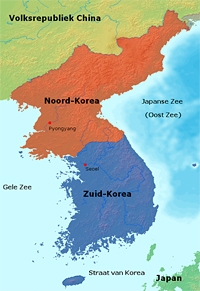North Korea: strategy, scoundrels and internment camps
The threats from North Korea have become so serious that the US and South Korea may feel compelled to respond. Remco Breuker, Leiden Professor of Korean Studies, would like to see a European mediator.
Diplomatic mediation
 'What should be done about North Korea? Threats of war continue to be made, at times reinforced by deploying rockets primed for action, or revoking treaties. The question is how long this spiral of escalations can continue. The North Korean threats are now so serious that it is conceivable that the US and South Korea may feel compelled to respond. Rather than waiting for that to happen, it would be preferable to intervene in the form of diplomatic mediation. Normally, the UN would be the appropriate body to try to reduce the tensions to an acceptable level. As chance would have it, the Secretary General of the UN is currently a South Korean: Ban Ki-Mun, a former Minister of Foreign Affairs in South Korea.'
'What should be done about North Korea? Threats of war continue to be made, at times reinforced by deploying rockets primed for action, or revoking treaties. The question is how long this spiral of escalations can continue. The North Korean threats are now so serious that it is conceivable that the US and South Korea may feel compelled to respond. Rather than waiting for that to happen, it would be preferable to intervene in the form of diplomatic mediation. Normally, the UN would be the appropriate body to try to reduce the tensions to an acceptable level. As chance would have it, the Secretary General of the UN is currently a South Korean: Ban Ki-Mun, a former Minister of Foreign Affairs in South Korea.'
EU mediator

'The UN has so far taken a restrained approach to the conflict. North Korea would regard intervention by a UN that is led by a South Korean as suspicious, and would in all probability reject any such move. This may be unwarranted, but it is nonetheless the political reality. In order not to immediately dismiss the option of diplomatic intervention with the possible disqualification of the UN, I believe it would be sensible to look to Europe. Unfortunately, the EU has some experience with regional conflicts, including the reunification of divided nations and conflict mediation. Not only that, the EU as an organisation has little direct interest in North-East Asia, which makes it possible to adopt a neutral position there. I would like to see the EU despatch a mediator with a spotless reputation to bring the parties involved to the negotiating table.'
Neutral party
'Why would the EU take such action? Firstly, why not? We are talking here about a potentially dangerous scenario in which a neutral party could offer a solution. Secondly, and this is even more important, because South Korea is a friendly state that is playing an increasing part in the daily lives of Europeans. The confrontation in the media seems to be primarily between North Korea and the US, but we cannot overlook the fact that it is South Korea that would pay the price in the event of a real conflict. And thirdly, because South Korea could become a large money-earner for the EU in the long term. South Korea has just proposed internationalising economic investments in North Korea. At some point in the future these tensions will be over. A united Korea has the potential to be the world's third largest economy.'
Alleviate the needs of the average Korean
'It may seem strange, but South Korea is already the world's eleventh largest economy and North Korea has large reserves of valuable minerals, as well as a highly educated workforce. In concrete terms this could mean that other countries besides South Korea could invest in the Kaesong Industrial Complex, for example. This would generate not only money (wage costs are very low, for instance), it would also alleviate the needs of the average North Korean for whom food is difficult to come by and it would in the longer term lead to a society in which internment camps are a thing of the past. The pressure that is currently being exerted is having no effect at all on these camps.'
In other words, there are reasons enough to seek a diplomatic resolution to the crisis in the Korean peninsula, And Europe could make a constructive contribution to resolving the conflict.'
